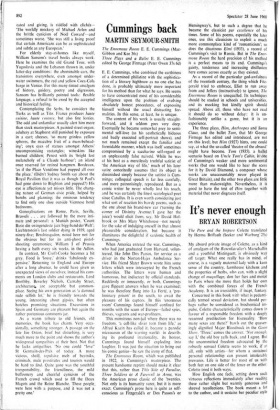Cummings back
MARTIN SEYMOUR-SMITH
Three Plays and a Ballet E. E. Cummings edited by George Firmage (Peter Owen 37s 6d) E. E. Cummings, who combined the earthiness of a determined philistine with the sophistica- tion of a literary highbrow as no one else has done, .is probably ultimately more important for his method than for what he says. He seems to have concentrated most of his considerable intelligence upon the problem of evolving absolutely honest procedures, of expressing himself without the usual distracting for- malities. In this sense, at least, he is unique.
The content of his work is usually straight- forward, and it seldom goes very deep. Eventually he became somewhat prey to senti- mental self-love (as his aesthetically hideous and badly executed self-portrait shows), and not much remained except the familiar and formidable manner, which was itself sometimes compromised by a saccharine self-regard or an unpleasantly false naivete. While he was at his best as a mercilessly truthful satirist of 'the American way of life,' much of his later satire conceitedly assumes that its object is diminished simply because the satirist is Cum- mings; colloquial speech is far less carefully, and more patronisingly, reproduced. But as a comic writer he never wholly lost his touch, and he was certainly the finest scatological poet since Catullus. It is even worth considering just what sort of reaction his bawdy poems, such as the one about his brand-new car ('turning the corner of Divinity Avenue/I gave her the juice') would elicit from, say, Mr David Hol- brook or Mrs Mary Whitehouse—not merely for the sake of indulging oneself in that almost pleasurable consideration, but because it illuminates the delightful if sardonic health of Cummings.
When America entered the war, Cummings, who had just graduated from Harvard, volun- teered, like John Dos Passos, for service as a driver in the Norton-Hajes Ambulance Ser- vice. His friend Slater Brown wrote him some letters which were intercepted by the French authorities. The letters were human and humorous, but indiscreet by official standards. Recklessly or innocently, or both, Cummings gave flippant answers when he was examined; he was therefore flung into La Ferte, a 'pre- liminary prison' in the south, to await the pleasure of his captors. In this 'enormous room' Cummings found himself confined for months with the scum of Europe—failed spies, thieves, vagrants and war-profiteers.
This monstrous non-jail where there was no freedom, 'a cell-like sliver torn from life,' as Alfred Kazin has called it, became a parodic microcosm of the warring world : in describ- ing its profound irrationality, its horror, Cummings found himself exploding into laughter. It was just the situation to bring out his comic genius—he saw the irony of that.
The Enormous Room, which was published in 1922, is Cummings's masterpiece. The present handsome reprint should make it clear that this, rather than This Side of Paradise, Three Soldiers or A Farewell to Arms, was the American prose classic of the 'twenties. Not only is its humanity surer, but it is more exact. Cummings's prose here is quite as self- conscious as Fitzgerald's or Dos Passos's or Hemingway's, but to such a degree that he became the classicist par excellence of his times. Some of his poems, especially the later ones, use this classicism to exploit a much more commonplace kind of 'romanticism'; so does the disastrous Eimi (1933), a record of Cummings's visit to Russia. But in The Enor- mous Room the hard precision of his method is a perfect means to its end. Cummings's gaiety, tenderness and increasing disillusion here comes across exactly as they existed.
As a record of the particular god-awfulness of the twentieth century, the thing which Fitz- gerald tried to embrace, Eliot to run away from and Jeffers (instructively) to ignore, The Enormous Room is unequalled. Its techniques should be studied in schools and universities, and its mocking but kindly spirit should spread. Above all, those who have not read it should do so without delay : it is un- fashionably unlike a game, but it is an experience.
The three plays, Him, Anthropos and Santa Claus, and the ballet Tom, that Mr George Firmage has edited and introduced, are not on this level; but Him (1927) hints, one could say, at what the so-called 'theatre of the absurd' might have become. Tom (1935), a ballet scenario based on Uncle Tom's Cabin, is one of Cummings's weaker and more sentimental works (but one would like to hear the score for it by David Diamond, a composer whose works are unaccountably never played in Great Britain), and the other two plays are little more than makeweights. Nevertheless, it is good to haSe the text of Him together with material that never disgraces itself.


















































 Previous page
Previous page